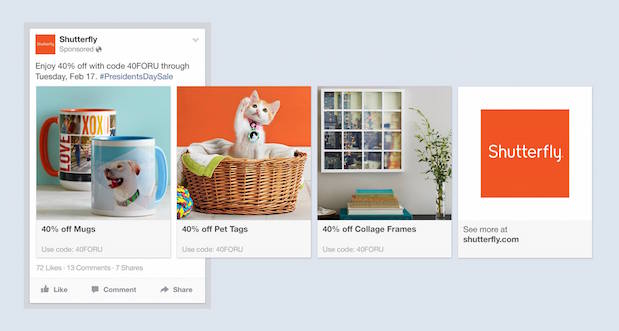Save 50% on a 3-month Digiday+ membership. Ends Dec 5.

The free ride is over on Facebook.
Last November, Facebook said that it was changing the news feed algorithm to limit distribution on posts it deemed “feel too promotional.” Now, surprise, Facebook has a new ad format that allows retailers to distribute exactly those kinds of promotional posts. The change is the latest in a series of steps the platform has taken to cut off organic reach of what are in effect ads.
“For news feed, there’s a percentage of posts that are going to be from your friends, that are news, that are entertainment and that are from brands,”Jason Stein, president of digital agency Laundry Service, told Digiday. “What Facebook is trying to say is that almost all the posts you see from brands should be paid for, whereas the entertainment and news should be organic.”
The new ads, dubbed product ads, are self-explanatory: They’re designed to help retailers and brands promote and sell specific products through Facebook’s news feed. Retailers can also use them to retarget users who previously visited their websites; look at a shoe on an e-commerce website, and you might see an ad for that pair next time you open Facebook.
A blog post about the announcement included an example of photo delivery service Shutterfly using the new ad. The ad includes the copy “Enjoy 40% off with the code 40FORU through Tuesday, Feb. 17. #PresidentsDaySale.”

When Facebook announced it would throttle overly promotional posts last November, it said posts that “solely push people to buy a product” would see a decrease in distribution. The announcement included a hypothetical example of an overly promotional post with copy that read “Only 15 minutes left to get your Bunny Bucks for 53% off!”
Ad position: web_incontent_pos1

Facebook said that the decision to crack down on overly promotional posts was precipitated by user complaints. Facebook’s chief product officer, Chris Cox, maintained a similar position yesterday at Recode’s Code Media, where he said that Facebook does not “dial down” certain posts. Rather, Facebook’s users have their collective hand on the dial; their clicks and likes determine how certain kinds of posts are featured in news feed.
Some worried last November that Facebook, instead of letting its users decide what posts were and were not worth seeing, had become an arbiter of taste.
So, FB is cracking down on “overly promotional” posts. Who draws the line? “Overly” may be just right for some.
— Debra Aho Williamson (@DebraWilliamson) November 17, 2014
And many small business owners bemoaned the change, saying that they relied on supposedly overly promotional posts to drive sales, according to a report in The Wall Street Journal.
Ad position: web_incontent_pos2
Yory Wurmser, retail analyst at eMarketer, said that while the new ads are not a “one-to-one replacement” for promotional posts, the two are not entirely separate, either.
“Within the big picture, Facebook has substantially reduced reach on brand posts,” he told Digiday.
Stein added that while organic reach on promotional posts, as with all posts, is trending toward zero, organic reach still plays in a vital role on Facebook in that it extends the reach of paid posts. Advertisers see a lower CPM on paid posts that users share with their friends, he said.
So brands can still annoy users with promotional product posts, they now just have to pay Facebook to do so.
Homepage image courtesy Getty Images
More in Media

What publishers are wishing for this holiday season: End AI scraping and determine AI-powered audience value
Publishers want a fair, structured, regulated AI environment and they also want to define what the next decade of audience metrics looks like.

Digiday+ Research Subscription Index 2025: Subscription strategies from Bloomberg, The New York Times, Vox and others
Digiday’s third annual Subscription Index examines and measures publishers’ subscription strategies to identify common approaches and key tactics among Bloomberg, The New York Times, Vox and others.

From lawsuits to lobbying: How publishers are fighting AI
We may be closing out 2025, but publishers aren’t retreating from the battle of AI search — some are escalating it, and they expect the fight to stretch deep into 2026.
Ad position: web_bfu


